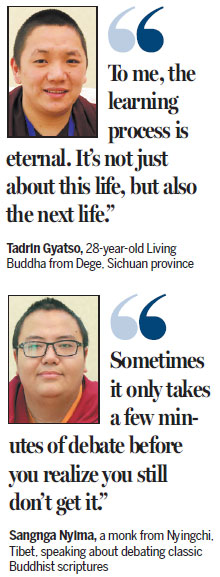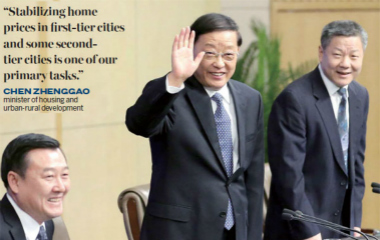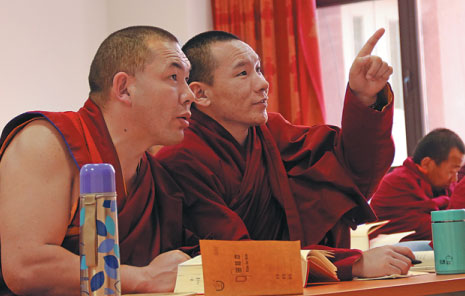Taking a new road to enlightenment
Updated: 2016-03-25 08:05
By Xu Wei(China Daily)
|
|||||||||
|
Students attend a Mandarin lesson. Xu Wei / China Daily |
Diverse curriculum
Despite the absence of distractions, some Chi Ram Pa candidates still find it difficult to complete the study of three of the five sutras within two years.
"Typically, the study of the five sutras requires several decades, but the learning process is much more compact here," said Sangnga Nyima, a monk from Tibet's Nyingchi county who follows the Nyingma school.
Nyima, who also studied at a Buddhist academy in Lhasa, the regional capital, said that compared with the education available at traditional temples, the Beijing college offers a diverse curriculum.
At the end of the three-year program, Tho Ram Pa candidates face the ultimate test: publicly debating the scriptures, a practice that continues the long tradition of Tibetan monks earning their diplomas through debate.
To prepare for the test, the students spend a couple of hours a day debating what they learned in class, but despite the daily practice, Nyima said the thought of debating with the masters still makes him nervous.
"It often seems that you are quite familiar with some parts of the sutras, but sometimes it only takes a few minutes of debate before you realize you still don't get it," he said.

It's essential for colleges and monasteries to guarantee the quality of the education they provide, so the standards are high and at least one candidate every year fails the course. To complete the program, students also have to write a dissertation on a subject of their own choosing.
"Candidates are also tested on their computer skills, because writing academic or religious papers often requires lots of online searches," Nyima said.
The students' time isn't exclusively devoted to study, though. Basketball courts and ping-pong tables are easily accessible within the college, and the candidates also make field trips to Buddhist temples across the country and visit major businesses in Beijing.
Looking ahead
Liu, the vice-president, said the courses are designed to ensure that the students will better serve the local population when they return to their home monasteries
Although many students find the Mandarin classes difficult, they acknowledge that they will benefit from learning the language. Tadrin Gyatso plans to renovate his monastery when he returns home after obtaining his diploma, and the task will stretch his language skills.
"One thing for sure is that I will have a lot of discussions with Han Chinese workers and business owners," he said. "As the abbot, I have to be more than just an expert on Buddhist scriptures, I have to learn about the latest technology as well," he added.
Nyima also believes that learning Mandarin will help him in the long term. "Right now, the number of Han Chinese in my hometown is rising; some of them will require my services and I will require theirs from time to time. So, it will be beneficial to know Mandarin," he said.
The college diploma will not signal the end of his studies, instead it will be the starting point for further study of the scriptures.
Like Tadrin Gyatso, he plans to return to his monastery after graduation and play a part in the ongoing renovation project.
"After that, I will start another study tour around the monasteries in Tibet for maybe another seven to eight years. Eventually, I will settle down in my monastery and start giving lectures on Buddhism," he said.
Today's Top News
President optimistic for Sino-German cooperation
Info sharing 'is key' as Europe faces terror threat
Uneasy times as Belgium mourns the dead
Belgian bombing suspect still at large: Prosecutor
Belgian media withdraws reports of suspect's arrest
Brussels bombers were brothers El Bakraoui
Chinese citizens in Belgium get help after attack
Europe ramps up security in wake of Brussels attacks
Hot Topics
Lunar probe , China growth forecasts, Emission rules get tougher, China seen through 'colored lens', International board,
Editor's Picks

|

|

|

|

|

|







